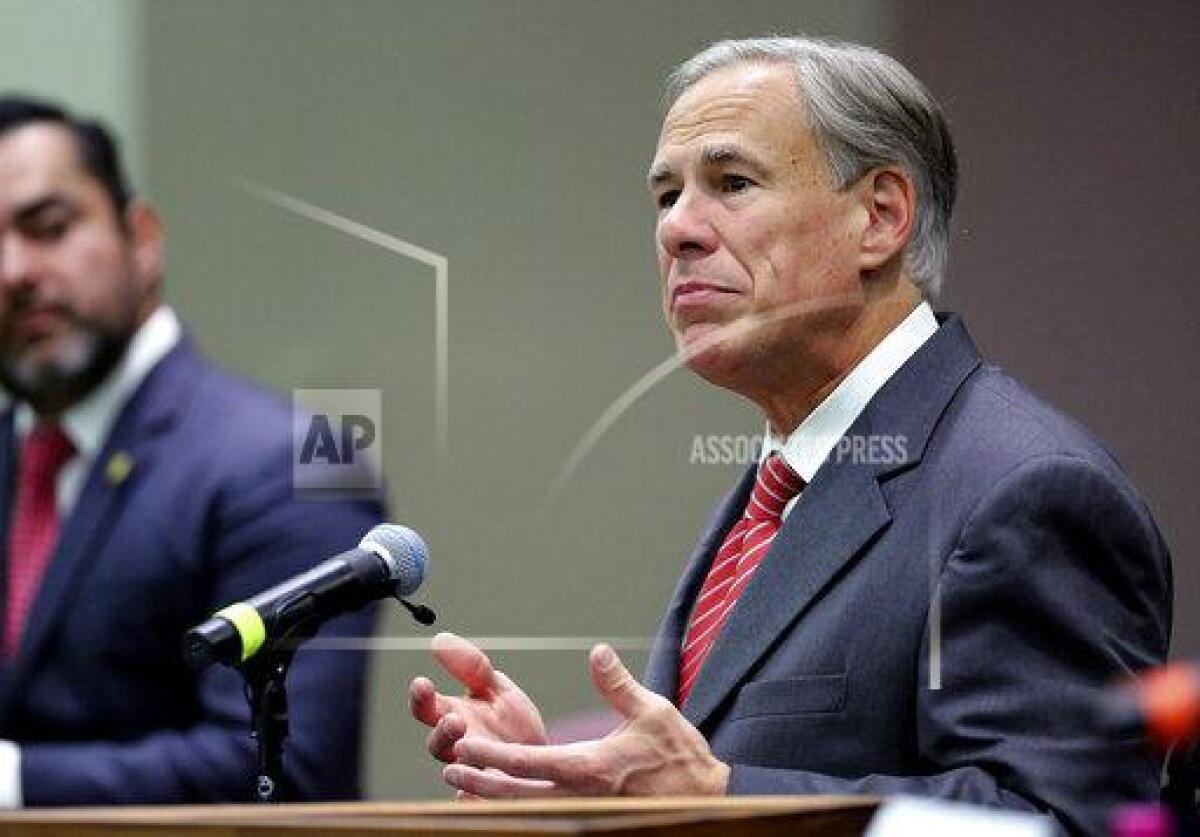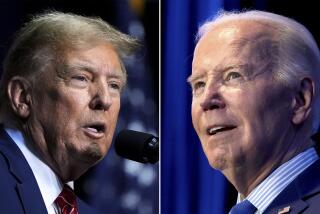Beto O’Rourke and Greg Abbott win nominations for governor in Texas primary

- Share via
AUSTIN, Texas — Republican Gov. Greg Abbott will seek reelection against Democrat Beto O’Rourke after voters in Texas opened what could be a lengthy, bruising primary season poised to reshape political power from state capitals to Washington.
Abbott and O’Rourke easily won their party’s nomination for governor on Tuesday. Abbott is now in a commanding position as he seeks a third term, beginning his run with more than $50 million and campaigning on a hard-right agenda in America’s largest Republican state. That leaves O’Rourke facing an uphill effort to recapture the magic of his 2018 Senate campaign, when he nearly ousted Republican Ted Cruz.
“This group of people, and then some, are going to make me the first Democrat to be governor of the state of Texas since 1994,” O’Rourke told supporters in Fort Worth, where in 2018 he flipped Texas’ largest red county. “This is on us. This is on all of us.”
Abbott said, “Republicans sent a message.”
“They want to keep Texas on the extraordinary path of opportunity that we have provided over the past eight years,” his campaign said in a statement.
The GOP primary for state attorney general was more competitive. Incumbent Ken Paxton, endorsed by former President Trump, was forced into a runoff as he faced several Republican challengers, including Texas Land Commissioner George P. Bush, the nephew of one president and grandson of another. Paxton’s failure to win outright was a setback for Trump, who has championed conservative Republicans in races around the country as he seeks to reinforce his control over the national GOP.
Beto O’Rourke pursues a go-everywhere strategy in running for Texas governor, hoping to detoxify his party’s image in rural America.
The primary was the first under restrictive new Texas voting laws that, among other changes muscled through by the GOP-controlled Legislature, require mail ballots to now include identification — a mandate that counties blamed for thousands of rejected mail ballots even before election day. More than 10,000 mail ballots around Houston alone were flagged for not complying. Technical issues also caused problems in Texas’ largest county: Paper jams and paper tears in voting machines would take a couple of days to work through while counting, said Isabel Longoria, Harris County’s elections administrator.
Several voting sites around Houston were also short-staffed, she said, causing tensions in some locations.
“Democrats and Republicans bickering with each other, stealing each other’s machines, hiding each other’s paper,” Longoria said. “At the end of the day, [poll workers] were able to help voters.”
The primary season, which picks up speed in the summer, determines which candidates from each party advance to the fall campaign. The midterms will ultimately serve as a referendum on the first two years of President Biden’s administration, which has been dominated by a pandemic that has proved unpredictable, along with rising inflation and a foreign policy crises including Russia’s unprovoked invasion of Ukraine. The GOP, meanwhile, is grappling with its future as many candidates seeking to emerge from primaries, including a sizable number in Texas, tie themselves to Trump and his lie that the 2020 election was stolen.
Texas’ rapid growth — driven by more than 4 million new residents — has shifted once solidly red suburbs away from Republicans. But the GOP has countered with new restrictions on voting and redrawn maps that left fewer competitive congressional districts. That means the primary winners mostly had strong chances to cruise in November and head to Congress next year.
Get our L.A. Times Politics newsletter
The latest news, analysis and insights from our politics team.
You may occasionally receive promotional content from the Los Angeles Times.
While much of the attention in this GOP-dominated state was on Republicans, Democrats faced challenges of their own. The party hasn’t won a statewide office since 1994. And on Tuesday, nine-term U.S. Rep. Henry Cuellar was trying to avoid becoming the first Democratic member of Congress to lose a primary this year. He’s facing progressive Jessica Cisneros and is contending with the fallout of a recent FBI raid on his home, though he’s denied wrongdoing.
The primary also tested Republican efforts to more aggressively court Latino voters. Counties along the state’s border with Mexico, long a stronghold for Democrats, were on track to smash Republican turnout levels compared with recent elections.
That was the latest warning sign for Democrats who are trying to hold the line with Latino voters who swung toward Trump in 2020.
Republicans are betting that the Texas primaries will be the first step toward retaking Congress in November, pointing to Biden’s low approval ratings, spiking inflation and last year’s chaotic withdrawal of U.S. forces from Afghanistan.
More to Read
Get the L.A. Times Politics newsletter
Deeply reported insights into legislation, politics and policy from Sacramento, Washington and beyond. In your inbox three times per week.
You may occasionally receive promotional content from the Los Angeles Times.











